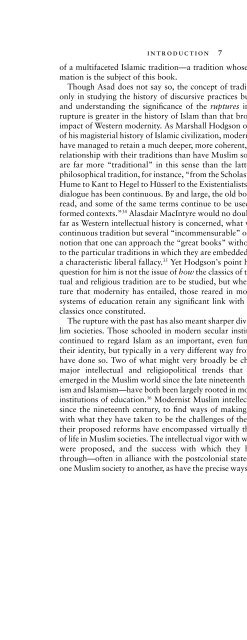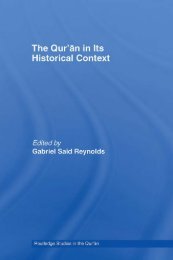Download (1 MB) - Islam and Christian-Muslim Relations: Articles ...
Download (1 MB) - Islam and Christian-Muslim Relations: Articles ...
Download (1 MB) - Islam and Christian-Muslim Relations: Articles ...
Create successful ePaper yourself
Turn your PDF publications into a flip-book with our unique Google optimized e-Paper software.
INTRODUCTION 7of a multifaceted <strong>Islam</strong>ic tradition—a tradition whose modern transformationis the subject of this book.Though Asad does not say so,the concept of tradition is helpful notonly in studying the history of discursive practices but also in tracking<strong>and</strong> underst<strong>and</strong>ing the significance of the ruptures in that history. Norupture is greater in the history of <strong>Islam</strong> than that brought about by theimpact of Western modernity. As Marshall Hodgson observed at the endof his magisterial history of <strong>Islam</strong>ic civilization,modern Western societieshave managed to retain a much deeper,more coherent,<strong>and</strong> more integralrelationship with their traditions than have <strong>Muslim</strong> societies: the formerare far more “traditional” in this sense than the latter. In the Westernphilosophical tradition,for instance,“from the Scholastics to Descartes toHume to Kant to Hegel to Hüsserl to the Existentialists,the philosophicaldialogue has been continuous. By <strong>and</strong> large,the old books continue to beread,<strong>and</strong> some of the same terms continue to be used,even if in transformedcontexts.” 34 Alasdair MacIntyre would no doubt respond that,sofar as Western intellectual history is concerned,what we have is not onecontinuous tradition but several “incommensurable” ones. Moreover,thenotion that one can approach the “great books” without much attentionto the particular traditions in which they are embedded is,for MacIntyre,a characteristic liberal fallacy. 35 Yet Hodgson’s point here is different: inquestion for him is not the issue of how the classics of the <strong>Islam</strong>ic intellectual<strong>and</strong> religious tradition are to be studied,but whether,with the rupturethat modernity has entailed,those reared in modern,Westernizedsystems of education retain any significant link with the tradition suchclassics once constituted.The rupture with the past has also meant sharper divisions within <strong>Muslim</strong>societies. Those schooled in modern secular institutions have oftencontinued to regard <strong>Islam</strong> as an important,even fundamental,part oftheir identity,but typically in a very different way from how the ‘ulamahave done so. Two of what might very broadly be characterized as themajor intellectual <strong>and</strong> religiopolitical trends that have successivelyemerged in the <strong>Muslim</strong> world since the late nineteenth century—modernism<strong>and</strong> <strong>Islam</strong>ism—have both been largely rooted in modern,Westernizedinstitutions of education. 36 Modernist <strong>Muslim</strong> intellectuals have sought,since the nineteenth century,to find ways of making <strong>Islam</strong> compatiblewith what they have taken to be the challenges of the modern age. Andtheir proposed reforms have encompassed virtually the entire spectrumof life in <strong>Muslim</strong> societies. The intellectual vigor with which these reformswere proposed,<strong>and</strong> the success with which they have been carriedthrough—often in alliance with the postcolonial state—has varied fromone <strong>Muslim</strong> society to another,as have the precise ways in which different



